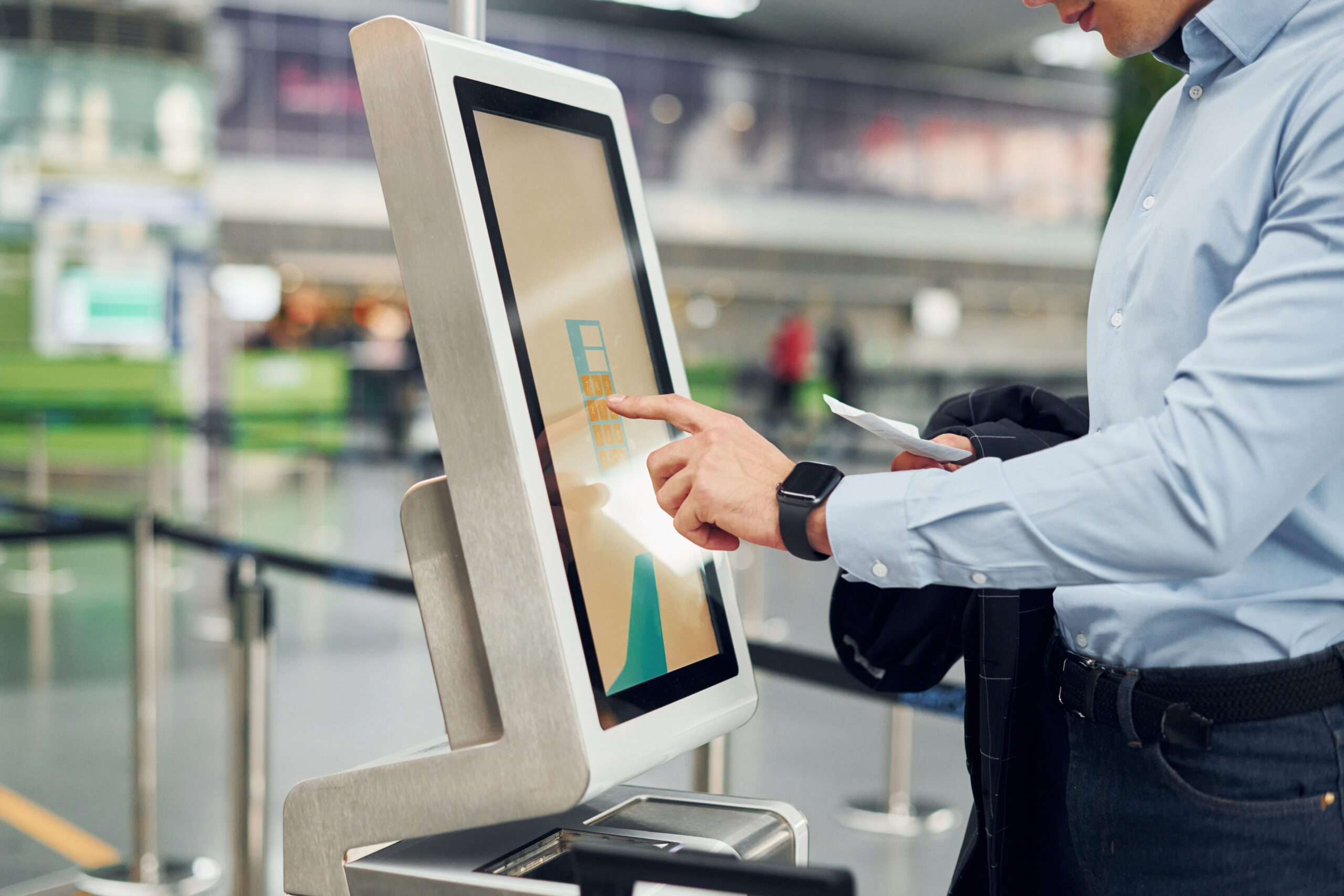Introduction
In today’s dynamic retail landscape, managing a multi-site restaurant business is a complex and multifaceted challenge. With geographically dispersed sites, each location brings its own set of challenges, from managing inventory to preserving brand identity. However, one of the keys to mastering this complexity lies in choosing the right point of sale (POS) system. A sophisticated POS system, particularly tablet-based ones, can transform the way multi-site businesses oversee their operations, providing a unified solution for simplified and efficient management. This introduction dives into the depths of multi-site management, highlighting the benefits of a tablet-based POS system, while exploring the key strategies for maintaining operational efficiency and a consistent customer experience across multiple locations. Throughout this article, we reveal the fundamental rules for success in the demanding world of multi-site commerce, with a focus on technological innovation and adaptive business strategy.
The Challenges of Multi-site Management
Managing a multi-site business is a complex exercise that requires a meticulous and strategic approach. This complexity is amplified by several key factors:
- Inventory synchronisation: Consistency of inventory across different sites is crucial. Challenges include tracking stock levels in real time, managing replenishments, and ensuring that each site has the products it needs without overstocking or stock-outs. Effective inventory management requires systems that can provide real-time updates and accurate forecasts.
- Maintaining Brand Consistency: Ensuring a consistent brand experience across all locations is essential. This includes consistency of customer service, product quality, marketing, and ambience. Discrepancies in brand experience can lead to customer confusion and diminished brand loyalty.

- Sales Data Centralisation: Collecting and analysing sales data from multiple sites can be complex. It is vital to have a system that can centralise this data for unified analysis and decision making. Accurate and accessible reports are needed to understand overall and site-specific performance, enabling strategic adjustments to be made.
- Ensuring effective communication and consistent training of staff across multiple sites is another challenge. It is important to have systems in place for standardised training, information sharing, and maintaining high standards of customer service.
- While maintaining brand consistency, it is essential to adapt to the particularities of local markets. This may include variations in product offerings, marketing strategies, and customer service approaches.
- Cost and Efficiency Management: Controlling costs while maximising operational efficiency is a major challenge. This involves balancing economies of scale with the investment required for each location, ensuring that each site makes a positive contribution to overall profitability.
Tablet-based POS systems offer several distinct benefits
In the dynamic retail and foodservice landscape, efficiency and flexibility are key to successfully running a multi-site business. Tablet-based point-of-sale (POS) systems, such as those promoted by Breeze offer a host of benefits that meet precisely these requirements.
- Improved efficiency: One of the major advantages of tablet-based POS systems is their ability to speed up transactions. With an intuitive user interface, these systems significantly reduce waiting time for customers, resulting in increased throughput and an improved customer experience. Employees can also move around more freely, offering a dynamic, personalised service.
- Centralised, simplified management: For a multi-site business, the ability to manage all operations from a central point is essential. Tablet POS systems can centralise sales, stock and employee data, providing a consistent and up-to-date overview of the entire business. This centralisation facilitates informed decision-making and the implementation of uniform strategies across all sites.
- Detailed Analysis and Reporting: Tablet-based POS systems go beyond simple transaction management. They provide real-time analysis and reporting, offering valuable insights into sales trends, product performance and customer behaviour. This data can be used to optimise operations, adjust product offerings and improve marketing strategies.
- Security and Scalability: Data security is a major concern for any business. Tablet POS systems offer advanced security features to protect sensitive customer and company information. What’s more, their flexibility allows easy scaling, making it easy to add new locations or upgrade existing systems.
- Reduced costs and increased ROI: Finally, these systems reduce operational and administrative costs. Less expensive than traditional systems, they offer a better return on investment thanks to their increased efficiency, their ability to generate additional sales and their ease of maintenance.
The Importance of a Business Plan Supported by a Multi-site POS System
In the complex and competitive world of multi-site businesses, creating a solid business plan is not just a preliminary step; it’s an ongoing necessity. An effective business plan must not only encapsulate the company’s overall objectives and strategies, but also incorporate appropriate technological solutions, such as a point-of-sale (POS) system designed specifically for multi-site operations.
The right POS system plays a pivotal role in achieving a company’s strategic objectives. Firstly, it facilitates uniform management across all sites, ensuring consistency and efficiency. For example, a Tablette based POS system can provide real-time information on sales, stock and staff performance across all sites, enabling rapid and informed decision-making.

In addition, a robust POS system helps to maintain alignment with the company’s vision. In a business plan, long-term objectives need to be supported by tools that can evolve and adapt to changes in the market. A multi-site POS system offers this flexibility, enabling companies to adjust quickly to emerging trends, such as the increase in online ordering or changing consumer preferences.
Data security is another crucial aspect. With operations spanning multiple sites, securing financial information and customer data becomes paramount. A quality POS system incorporates advanced security measures, ensuring that data is protected across all points of sale.
Finally, an effective POS system for multi-site businesses must offer an intuitive user experience for both employees and customers. This includes easy-to-use interfaces, flexible payment options and seamless integration with other management tools. An optimised user experience translates into increased productivity and improved customer satisfaction, essential factors for long-term success.
In short, a business plan for a multi-site enterprise must consider the central role of an appropriate POS system. It is not just a tool for day-to-day transactions, but a strategic element that supports and reinforces the company’s overall vision.
Key features of an effective POS system

An effective POS system for a multi-site business must offer a combination of centralised control, real-time analysis, intelligent stock management, customer focus, data security, integration and customisation, as well as ease of use. These features are crucial to managing operations effectively, satisfying customers and remaining competitive in a dynamic business environment.
Running a multi-site business requires a robust and versatile point-of-sale (POS) system. An ideal POS system should not only facilitate day-to-day transactions, but also offer advanced functionality to effectively manage operations across multiple locations. Here are the key features of such a system:
- Overview and Centralized Control: An effective POS system must provide a centralized view of all operations. This includes unified management of sales, inventory and performance at each location. This overview enables managers to make informed and consistent decisions across the entire network.
- Real-time analysis and reporting: The ability to access data and reports in real time is crucial. This enables businesses to monitor performance, identify trends, and react quickly to market changes or operational issues. Detailed reports also help to understand customer behaviour and optimise sales and marketing strategies.
- Intelligent stock management: An advanced POS system must offer accurate and automated stock management. This includes tracking stock levels, automatically updating inventory after each sale, and alerting you to low stock levels. Effective stock management reduces the risk of stock-outs and minimises surpluses, leading to improved profitability.
- Customer-focused functionality: A POS system should enhance the customer experience. This can include flexible payment options, integrated loyalty programmes, and the ability to manage personalised interactions. By focusing on the customer, businesses can increase customer satisfaction and loyalty.
- Security and Compliance: Data security is paramount, especially in a multi-site environment where sensitive information is constantly being exchanged. An effective POS system must ensure compliance with data security standards and offer robust functionality to protect customer information and transactions.
- Integration and customisation: The ability to integrate with other systems (such as accounting, HR, etc.) and to customise to the specific needs of the business is essential. A flexible POS system allows easy adaptation to business changes and market requirements.
- Ease of use and training: A POS system must be intuitive and easy for staff to use. Minimal training should be required, enabling rapid adoption by employees. This reduces operational errors and improves overall efficiency.
Customer Relationship Management
Customer Relationship Management (CRM) is a crucial aspect of any business, particularly those with multiple sites. In a competitive business environment, a company’s ability to understand, anticipate and respond to its customers’ needs is key to its success and growth.
The need to understand customer behaviour and to anticipate their changing interests has become obvious with the explosion of post visit surveys where restauranteurs hope to glean any small insights into their customer’s interests that may offer them an edge in winning the customers repeat business
Let’s emphasise the importance of this component, highlighting several essential aspects of an effective CRM in a multi-site context.

- Deep understanding of the customer: The first step in successful CRM is the collection and analysis of accurate customer data. Modern POS systems, particularly tablet-based ones, offer advanced data collection capabilities. These systems allow businesses to track the buying habits, preferences and behaviours of customers across different sites. This in-depth understanding enables them to personalise interactions and offer tailored experiences that meet customer expectations
- Personalisation and Engagement: Today’s customers expect personalised shopping experiences. An effective POS system helps multi-site businesses segment their customers and create personalised offers. Whether it’s targeted promotions, loyalty programmes or personalised communications, these strategies increase customer engagement and strengthen brand loyalty.
- Consistent management across multiple sites: A major challenge for multi-site businesses is maintaining consistent customer relationship management across all locations. Cloud-based POS systems provide a unified view of customer interactions across all sites. This ensures that service standards and the quality of the customer experience are consistent, regardless of location.
- Responsiveness and flexibility: The ability to react quickly to customer feedback and behaviour is essential. CRM tools integrated into today’s POS systems enable a rapid response to emerging trends and customer feedback. This responsiveness builds customer confidence and shows that the company is listening to their needs. Translated with www.DeepL.com/Translator (free version)
Responding to Changing Consumer Needs
- Adaptability to market trends: The rise of e-commerce and the growing preference for online delivery and ordering options mean that businesses need to be able to adapt quickly. Modern POS systems, particularly those based on iPads, offer the flexibility needed to integrate new functionalities, such as online order taking and delivery management. This adaptability allows businesses to remain relevant and competitive.
- Improving the Customer Experience: Today’s consumers are looking for a personalised and convenient shopping experience. An advanced POS system can collect and analyse customer data to deliver tailored experiences. Whether through product recommendations based on past preferences or targeted promotions, the aim is to create a deeper and more meaningful connection with the customer.
- Efficient order management: With the increase in online ordering, efficient order flow management is becoming crucial. POS systems must not only manage orders seamlessly, but also synchronise information between different sites. This ensures a consistent customer experience, whether in-store or online.
Conclusion
Managing a multi-site catering business requires an innovative and adaptive approach. Constantly changing customer expectations and the need for seamless management of operations across multiple sites make the use of advanced technological solutions essential. A robust POS system not only enables day-to-day operations to be managed with ease, but also provides valuable insights through data analysis and real-time reporting. This ability to collect and analyse data helps businesses to anticipate market trends, personalise the customer experience and make informed strategic decisions.
By integrating solutions like the Suite Breeze, a multi-site business can move beyond traditional management to fully embrace digital transformation. The Suite Breeze, with its innovative tools and customer-centric approach, ideally complements the functionality of an advanced POS system. This synergy enables businesses to successfully navigate an ever-changing commercial landscape, maximising efficiency, improving customer engagement and strengthening brand cohesion across all sites.

